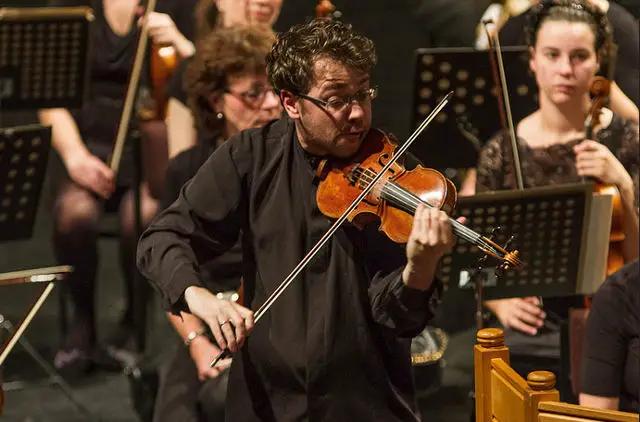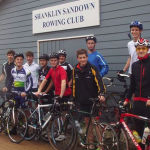Our thanks to Jonathan Dodd for his latest IWSO review of the Isle of Wight Symphony Orchestra. Ed
Last weekend marked the start of the new season for the Isle of Wight Symphony Orchestra. I was delighted to see that the Medina Theatre was packed, and that all the faces, familiar and new, were flushed with anticipation for a fine evening of great music.
This concert offered us a mixture of works, from Russia and Finland, and from France and Wales, short pieces and long ones, some of which required a soloist’s extraordinary skill, and others that highlighted the orchestra’s ability to play together, supporting and counterbalancing each other, working as a team of talented and hard-working individualists to make the whole concert greater than the sum of their parts. And so they did.
My slowly-growing appreciation of live Classical music
I was struck this time, in my slowly-growing appreciation of live Classical music, just how complicated the whole operation is. There can’t be many events more complex for someone to organise than a classical concert with a full orchestra. I was sitting there thinking about this while I waited for the music to start.
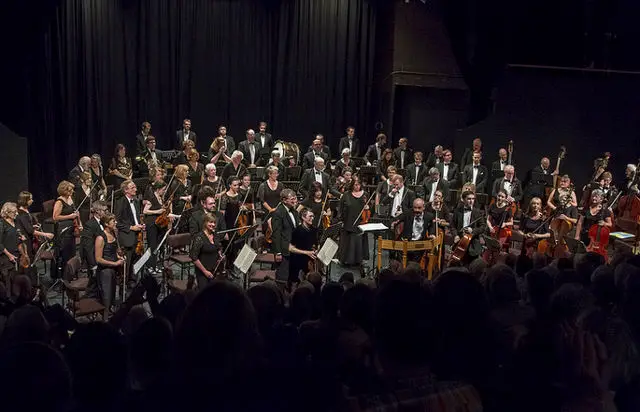
I counted 68 musicians, 41 playing stringed instruments, and the rest blowing into or striking a variety of different instruments in different ways. These instruments were made of wood, or metal, or skin, or a mixture of materials. All these people had to turn up at the right time, with their instruments. And all the instruments had to be tuned at exactly the right pitch. They had to make a harmonious noise.
Study and practise for a huge and unknown number of hours
Each musician had to have a seat in the right place, and the correct music, and they’d had to practise each piece of music for hours. They had to have been inspired by a music teacher to take up an instrument, and they had to study and practise for a huge and unknown number of hours before they became proficient. Some of them had easily portable instruments, like flutes or oboes. Others found themselves doggedly carting double-basses round, or huge drums. All for the opportunity of playing a few times a year to a real audience.
But as soon as the music started, I stopped worrying about whether anyone was ill, or might not know their parts properly, or might be out of tune, and as the music rose and gripped me, I realised that something magical happens, because the occasion does indeed cause all these diverse currents and flows to coalesce into a thing of beauty and brilliance, capable of lifting the musicians and their audience into a shared state of rapture.
What a privilege it is to be able to witness such a thing.
It whetted my appetite for what was to come
This time we were treated to the overture to a French opera called Mireille, by Charles Gounod. It behaved like all overtures, introducing and advertising themes and tunes that would recur later on, had we been able to see and hear the whole thing. The orchestra played with sparkle and clarity, as usual, and it whetted my appetite for what was to come.
The second piece was Welsh, ‘Hen Wlad Fy Nhadan’, or ‘Land of my Fathers’, by James James. It is popular at Welsh Rugby Matches and carries a great emotional charge, well summoned by the orchestra.
Notes poured from his flying fingers
The highlight of the first half was the Violin Concerto by Jean Sibelius, with guest soloist Alexander Sitkovetsky. I admit that I had never heard this before, although Sibelius is one of my favourite composers. I know Finlandia and the Korelia Suite best, and I particularly love Tapiola. Sibelius was a violinist himself, and his concerto seemed to me to be particularly difficult in terms of the range of notes and moods that had to be coaxed from the instrument.
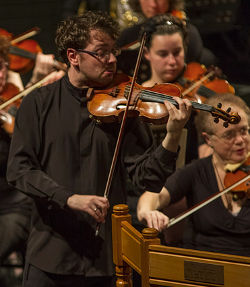 Mr Sitkovetsky played deliciously fast and passionately, his fingers flying, and he was obviously deeply entranced by the music itself. Some concertos are collaborative between the soloist and the orchestra, and others clearly are there to showcase the skills of the soloist.
Mr Sitkovetsky played deliciously fast and passionately, his fingers flying, and he was obviously deeply entranced by the music itself. Some concertos are collaborative between the soloist and the orchestra, and others clearly are there to showcase the skills of the soloist.
This was the case with Sibelius, I thought. The violin soared and growled, notes poured from his flying fingers, and the orchestra had to follow and be the background, which I imagine to be quite hard and require particular concentration. The IWSO were magnificent, and the soloist was inspired. I watched the faces of some of the musicians as it ended, and they were beaming. It was wonderful.
Sounds of such subtlety and energy and depth and collaboration
After the break we were treated to a huge symphony, Rachmaninov’s Second. This was for the full orchestra, and it lasted almost a whole hour, although it felt much shorter.
It was lush, and full of melody, and must have been terrifically hard work, in concentration as well as stamina. I’ve not heard this before either, but I liked it so much I went straight out and bought the CD, so I could relive that time when I sat there, entranced by the sweep of all the parts of the orchestra working together to produce sounds of such subtlety and energy and depth and collaboration.
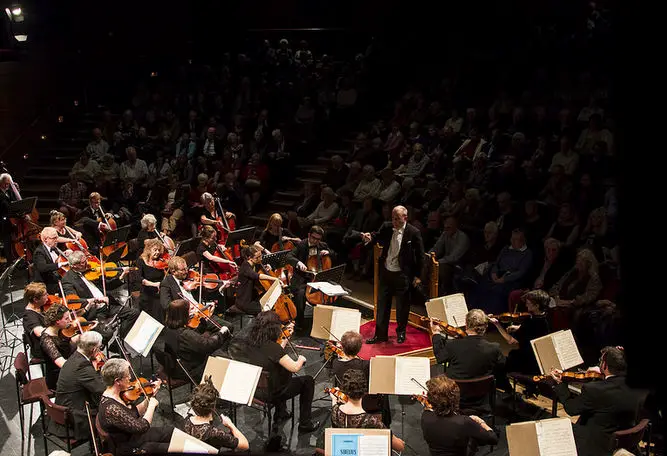
I’m so glad that everyone involved with the Isle of Wight Symphony Orchestra is so passionate about their music, because if they weren’t then I wouldn’t get the chance to enjoy so much delight and not a little awe. My life would go on of course, but it would be the poorer.
I’m a fan now, and I’ll keep turning up
So Bravo IWSO. I’m a fan now, and I’ll keep turning up.
The next concert is on January 24th. There’s another overture, this time by Vaughan Williams, called ‘The Wasps’. There’s a Viola Concerto, by York Bowen. Nobody ever writes music for the viola. It’s not given enough respect for the fine instrument it is. And there’s going to be another 2nd Symphony, this one by Elgar. I haven’t heard any of these before, and I know I’m going to enjoy it so much.
Get tickets, if you can. See you there.
Image: © With kind permission of Allan Marsh

